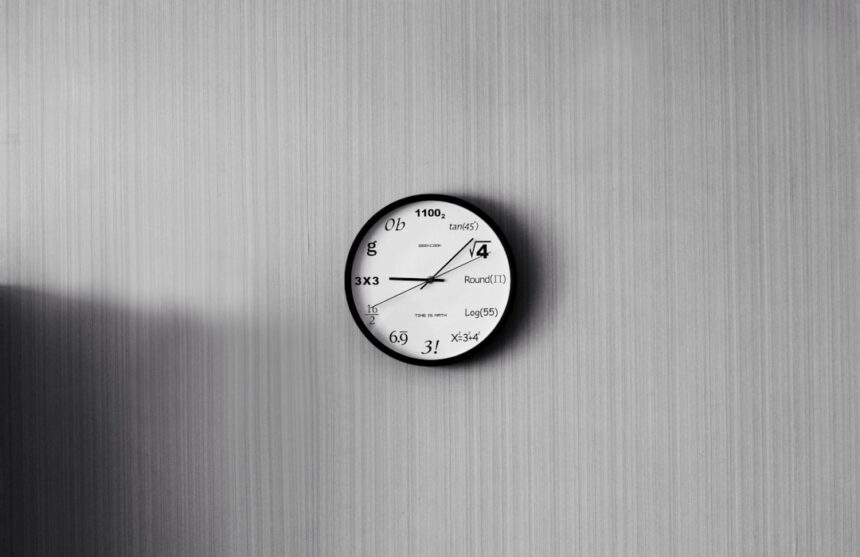Circadian rhythm refers to the natural, internal process that regulates the sleep-wake cycle and other physiological processes in your body. This rhythm operates on a roughly 24-hour cycle, responding primarily to light and darkness in your environment. You may not realize it, but your body has its own internal clock, known as the suprachiasmatic nucleus (SCN), located in the hypothalamus.
This tiny cluster of cells plays a crucial role in synchronizing your circadian rhythm with the external environment, ensuring that your biological functions align with the day-night cycle. Understanding circadian rhythm is essential for recognizing how it influences various aspects of your life. It governs not only when you feel sleepy or alert but also affects hormone release, eating habits, and even body temperature.
When your circadian rhythm is functioning optimally, you experience a sense of well-being and balance. However, disruptions to this rhythm can lead to a host of issues, impacting your overall health and quality of life.
Key Takeaways
- Circadian rhythm is the body’s internal clock that regulates the sleep-wake cycle and other physiological processes.
- Circadian rhythm plays a crucial role in regulating hormone production, metabolism, and immune function in the body.
- Disruptions to circadian rhythm can lead to sleep disorders such as insomnia and affect overall sleep quality.
- Imbalances in circadian rhythm have been linked to mental health conditions such as depression and anxiety.
- Maintaining a healthy circadian rhythm is essential for overall physical health, including cardiovascular health and metabolic function.
The Role of Circadian Rhythm in the Body
Circadian rhythms are fundamental to maintaining homeostasis within your body. They regulate numerous biological processes, including metabolism, immune function, and cardiovascular health. For instance, your body temperature fluctuates throughout the day, typically peaking in the late afternoon and dropping at night.
This natural variation helps optimize your physical performance and energy levels at different times of the day. Moreover, circadian rhythms influence the release of hormones such as cortisol and melatonin. Cortisol, often referred to as the stress hormone, peaks in the morning to help you wake up and feel alert.
In contrast, melatonin levels rise in the evening, signaling to your body that it’s time to wind down and prepare for sleep. This intricate interplay between various hormones and circadian rhythms is vital for maintaining your overall health and well-being.
How Circadian Rhythm Affects Sleep Patterns

Your sleep patterns are profoundly influenced by your circadian rhythm. When your internal clock is in sync with your environment, you tend to fall asleep easily at night and wake up refreshed in the morning. However, if your circadian rhythm is disrupted—due to factors like shift work, travel across time zones, or excessive screen time—you may experience difficulties falling asleep or staying asleep.
The timing of sleep is crucial for restorative processes that occur during the night. Deep sleep stages are essential for physical recovery, while REM sleep plays a significant role in cognitive functions such as memory consolidation and emotional regulation. When your circadian rhythm is misaligned, you may find yourself feeling groggy during the day or struggling with focus and concentration.
Understanding this connection can empower you to make lifestyle changes that promote better sleep hygiene.
The Impact of Circadian Rhythm on Mental Health
| Metrics | Findings |
|---|---|
| Depression | Disrupted circadian rhythm can lead to increased risk of depression. |
| Anxiety | Irregular sleep patterns can contribute to heightened anxiety levels. |
| Cognitive Function | Poor circadian rhythm can impair cognitive function and decision-making. |
| Mood Disorders | Disturbances in circadian rhythm are linked to mood disorders such as bipolar disorder. |
| Stress | Disrupted sleep-wake cycle can increase stress levels and reduce resilience. |
Your mental health is intricately linked to your circadian rhythm. Disruptions in this natural cycle can lead to mood disorders such as depression and anxiety. Research has shown that individuals with irregular sleep patterns often report higher levels of stress and emotional instability.
When your body’s internal clock is out of sync, it can exacerbate feelings of irritability and fatigue, making it challenging to cope with daily stressors. Furthermore, maintaining a consistent circadian rhythm can enhance your emotional resilience. Regular sleep patterns contribute to better mood regulation and cognitive function.
By prioritizing a healthy sleep schedule aligned with your natural circadian rhythm, you can foster a more positive mental state and improve your overall emotional well-being.
Circadian Rhythm and Physical Health
The implications of circadian rhythm extend beyond mental health; they also play a significant role in your physical health. Disruptions to this rhythm have been linked to various chronic conditions, including obesity, diabetes, and cardiovascular diseases. For instance, irregular eating patterns that deviate from your natural circadian rhythm can lead to metabolic dysregulation, increasing the risk of weight gain and insulin resistance.
Moreover, studies suggest that individuals who work night shifts or have irregular schedules may experience higher rates of chronic illnesses compared to those with consistent routines. This highlights the importance of aligning your daily activities—such as eating and exercising—with your circadian rhythm to promote optimal physical health. By doing so, you can enhance your body’s ability to function efficiently and reduce the risk of developing serious health issues.
The Influence of Circadian Rhythm on Hormonal Balance

Hormonal balance is another critical aspect influenced by your circadian rhythm. Hormones are released in a rhythmic pattern throughout the day, affecting various bodily functions such as metabolism, growth, and stress response. For example, testosterone levels typically peak in the morning for men, while estrogen levels fluctuate throughout the menstrual cycle for women.
Disruptions to your circadian rhythm can lead to imbalances in these hormones, potentially resulting in issues such as infertility or metabolic disorders. Additionally, cortisol levels are closely tied to your circadian rhythm. Elevated cortisol due to stress or irregular sleep patterns can lead to a cascade of negative effects on your health, including weight gain and weakened immune function.
By maintaining a regular sleep schedule and managing stress effectively, you can support hormonal balance and promote overall well-being.
Circadian Rhythm and Productivity
Your productivity levels are also influenced by your circadian rhythm. Many people experience peaks in focus and creativity at specific times of the day based on their individual biological clocks. For instance, some may find that they are most productive in the morning when their energy levels are high, while others may hit their stride later in the day or even at night.
Understanding your own circadian rhythm can help you optimize your work schedule for maximum efficiency. By aligning tasks that require deep concentration with your peak productivity hours, you can enhance your performance and achieve better results. Additionally, taking breaks during low-energy periods can help recharge your mind and maintain overall productivity throughout the day.
The Connection Between Circadian Rhythm and Aging
As you age, changes in your circadian rhythm can become more pronounced. Older adults often experience alterations in their sleep patterns, including difficulty falling asleep or waking up earlier than desired. These changes can impact not only sleep quality but also overall health and cognitive function.
Research suggests that maintaining a healthy circadian rhythm may play a role in promoting longevity and reducing age-related decline.
External Factors that Disrupt Circadian Rhythm
Several external factors can disrupt your circadian rhythm, leading to negative consequences for your health and well-being. One of the most common culprits is exposure to artificial light, particularly from screens on devices such as smartphones and computers. Blue light emitted by these screens can interfere with melatonin production, making it harder for you to fall asleep at night.
Other factors include irregular work schedules, travel across time zones (jet lag), and lifestyle choices such as late-night eating or excessive caffeine consumption. Recognizing these disruptors is essential for taking proactive steps to protect your circadian rhythm and maintain optimal health.
Strategies for Aligning with Circadian Rhythm
To align with your circadian rhythm effectively, consider implementing several strategies into your daily routine. First and foremost, establish a consistent sleep schedule by going to bed and waking up at the same time each day—even on weekends. This practice helps reinforce your body’s internal clock.
Additionally, prioritize exposure to natural light during the day while minimizing artificial light exposure in the evening. Engaging in regular physical activity can also support a healthy circadian rhythm; however, try to avoid vigorous exercise close to bedtime as it may interfere with sleep onset. Lastly, consider incorporating relaxation techniques such as meditation or deep breathing exercises into your evening routine to signal to your body that it’s time to wind down.
Seeking Professional Help for Circadian Rhythm Disorders
If you find that disruptions to your circadian rhythm are significantly impacting your quality of life—whether through chronic insomnia, excessive daytime sleepiness, or other related issues—it may be beneficial to seek professional help. Healthcare providers specializing in sleep medicine can offer valuable insights into diagnosing potential circadian rhythm disorders. Treatment options may include cognitive behavioral therapy for insomnia (CBT-I), light therapy for seasonal affective disorder (SAD), or even medication in some cases.
By working with a professional, you can develop a tailored plan that addresses your specific needs and helps restore balance to your circadian rhythm. In conclusion, understanding circadian rhythms is essential for optimizing both physical and mental health. By recognizing their influence on various aspects of life—from sleep patterns to hormonal balance—you can take proactive steps toward aligning with this natural cycle for improved well-being.
Circadian rhythms are natural, internal processes that regulate the sleep-wake cycle and repeat roughly every 24 hours. These rhythms are influenced by external cues like light and temperature, playing a crucial role in determining sleep patterns, feeding behaviors, hormone release, and other bodily functions. For a deeper understanding of how these rhythms impact mental health and well-being, you can explore a related article on the topic by visiting




